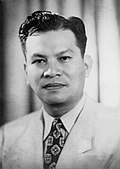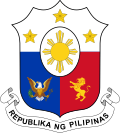| Quezon Service Cross | |
|---|---|
 Badge of the Quezon Service Cross | |
| Type | Decoration |
| Awarded for | "Exemplary service to the nation in such a manner and such a degree as to add great prestige to the Republic of the Philippines, or as to contribute to the lasting benefit of its people." [1] |
| Country | Philippines |
| Presented by | the President of the Philippines with the concurrence of the Congress of the Philippines |
| Eligibility | Filipino citizens |
| Motto | SIC FLORET RESPUBLICA And thus, he distinguished the republic [2] |
| Status | Currently awarded |
| Established | October 21, 1946 |
| First award | June 12, 1956 |
| Final award | December 3, 2018 |
| Total | 6 |
| Total awarded posthumously | 5 |
| Total recipients | 6 |
| Ribbon bar of the award | |
| Precedence | |
| Next (higher) | None (highest) |
| Next (lower) | Order of Lakandula Order of Sikatuna Philippine Legion of Honor |
The Quezon Service Cross (Filipino : Krus ng Serbisyo ni Quezon) [1] is the highest order of the Republic of the Philippines. It has been awarded to only a handful of Filipinos since its creation in 1946. [2] [3]










